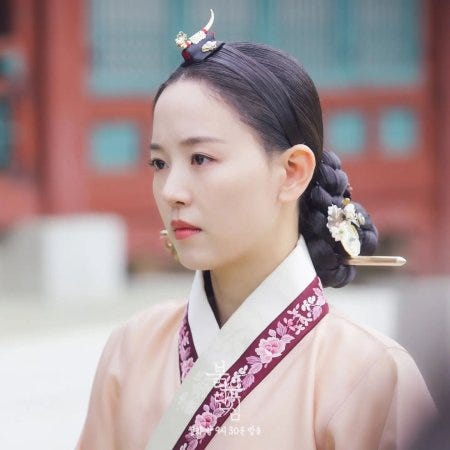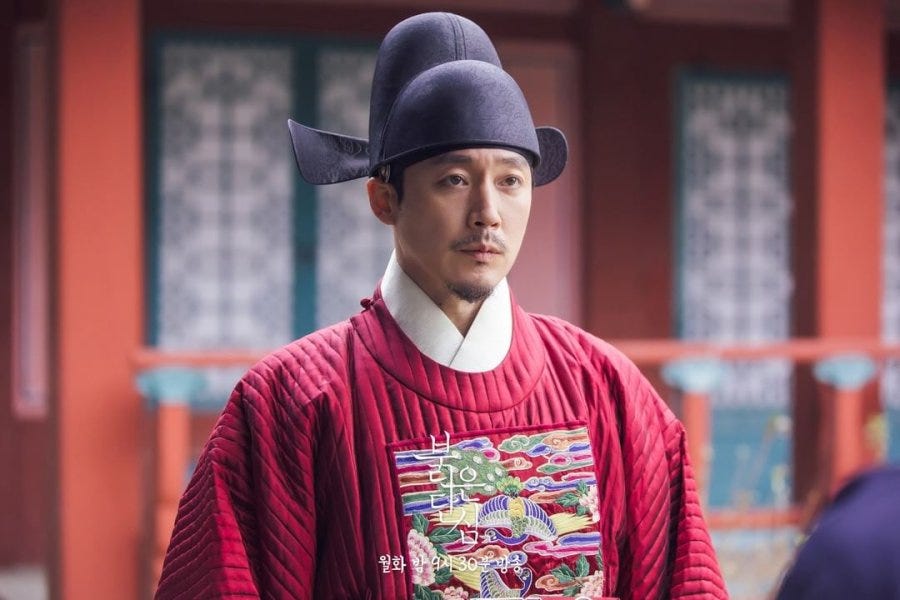Red/Bloody Heart (2022) A Review
In an essay entitled “Equality”, C.S. Lewis, the British thinker (better known as the author of the Narnia Chronicles) once made the following comments:
I am democrat because I believe in the Fall of Man. I think most people are democrats for the opposite reason… Mankind is so fallen that no man can be trusted with unchecked power over his fellows. Aristotle said that some people were only fit to be slaves. I do not contradict him. But I reject slavery because I see no men fit to be masters.1
I quote Lewis here because it highlights the dilemma that is at the centre of the drama in question: If no man is fit to command others what are we left with? Lewis of course is a modern man with modern thoughts and Joseon is hardly any bastion of democracy as we know it. The predicament, however, is much the same. Human beings are creatures prone to excesses, so mechanisms must exist in order that there be the right kind of restraints in order that tyranny can be circumvented. The tendency is for absolute power to corrupt absolutely even if with the best of intentions because there is something about the fragility of humanity.
So what are the intentions of the key players in this piece of political theatre? Who has the right to rule? What has the right to decide? And does he (or even she) who rules be granted unlimited power or be given unquestioningly loyalty? These fundamentally lead to the question of what good governance looks like.
At the end of the day, the answer to those claims are not political but embedded in anthropological and metaphysical assumptions. Is the king deserving or worthy of the kind of veneration and trust that are reserved for gods?
Lee Tae (Lee Joon) feels entitled to rule unhindered not just by virtue of his birthright but more importantly because he perceives himself as the protagonist of a compelling victim narrative in search of vengeful resolution. There’s no doubting that his father, mother, his preferred crown princess Yoo Jeong (Kang Ha-na) were caught in the crossfire of a climate of suspicion after the ousting of Lee Tae’s grandfather whose tyrannical ways oversaw a sea of bloodletting. Left Councillor Park Gye-won (Jang Hyuk) who led the overthrow of the despot is fingered (understandably) by the deeply resentful Lee Tae as the villain of the piece. Indeed, the young king has reason to. As a result of his machinations past and present, Park Gye-won is arguably the most powerful man in Joseon, more feared than the king. Councillor Park is ever vigilant lest another tyrant emerges to take the place of the one he ousted. Ironically of course, in a real enough way, it is the councillor’s actions that leads Lee Tae to struggle so desperately to regain the kind of dominance that led to his grandfather’s downfall. Neither man is a villain but rivals with competing notions of what a well-governed country looks like.
To keep the young king in check, Councillor Park had his old lover (now the Dowager Queen) installed as the late king’s concubine in years gone by. Her motivations are far more muddled and often unconvincing. Perhaps for her it’s entirely about love. Thinking about her, I am reminded of the old adage that “hell has known no fury like a woman scorned”. She is disturbed when Councillor Park, despite earlier misgivings, throws his weight entirely behind the intelligent Yoo Jeong as the country’s future queen. Clearly jealousy is a factor so is fear of being abandoned. Immediately she swings into action, not realising that she is a pivotal figure of a much larger plot which hinges on her partaking in somebody else’s victim narrative while wallowing in her own.
In the battleground of palace politics, the victim narrative seems like an odd fixture whose primary purpose is to eventually drive the agenda of entitlement. Those that see themselves as “victims” depict themselves as the “oppressed” clearing the stables of “oppressors”. A bloodbath inevitably follows.
This is one of those drama undertakings in which the second half of the show is superior to the first. On hindsight the first half is entirely devoted to engine building before the operational switch is flipped and the machinery kicks into gear. Then only do the intentions behind the engine gradually unfold. The engine itself is a double-edged sword which is meant to solidify and consolidate power but as sure as the sun rises in the east, unintended consequences are bound to happen.
It’s yet another reason why no single person or entity should be allowed to wield that much power even if ( a very big "if") they have the best of intentions. Because no one can see far ahead enough and calculate to the extent where they can take every single variable into consideration. Like C.S. Lewis, I don't have that kind of faith in fundamentally self-interested human beings to allow them to rule unfettered. In the case of Lee Tae who is always a morally nebulous character despite depicting himself as a victim of political machinations is ultimately seen to be not entirely trustworthy. He may be a king -- the highest office holder in the land and the bucks stops with him -- but he is still only a man with emotions that can swing him to taking the easy way out in everything. Violence can solve many problems easily and swiftly but as Lee Tae comes to realise, a consultative government might be less efficient but it means that lines that should never be crossed will remain respected social boundaries for the stability of the social fabric.
Politics then is the art of compromise as a wise man once said. Certainly it's the case here where individuals with different agendas can find common cause for greater good. The case for the queen as the mechanism of restraint is a compelling one. Certainly if she’s Yoo Jeong played by Kang Ha-na in her first lead role. The casting is spot on here. She projects the right amount of gravitas to assure us all that while she's around, the king will be less prone to violent spurts. Aside from producing male heirs, she’s the political anchor that the nation desperately needs to forge not just a middle way but another way in which the king and his officials can meet and come to mutually satisfying solutions. She is the glue that’s been sorely missing. On top of that she has wisdom beyond her years because even though she knows that Consort Cho is her biggest rival, the latter is also someone who can keep her honest and on her toes.
The ending is surprisingly good. Maybe I’m used to second-rate ones that this one feels especially stellar. It’s wrapped up in leisurely satisfying fashion. It lands as it should and everyone are where they should be.. for now. Even the young king has learnt a thing or two as he reflects on his successful bid for supremacy. To his credit, he accepts the reality that he cannot rule without the restraints of law and customs as well as healthy opposition from his own beloved queen.
As I’ve said here and elsewhere, it’s been far too long since we’ve been gifted a sageuk with serious historical creds that’s not only a visual feast but boasts a cast of actors who can make the political theatre work on different levels. For his first outing into sageuks, Lee Joon has done well. It’s not too hard to see why he was offered the role because Lee Tae is not a particularly saintly figure and he’s quite capable of being the biggest villain in the room if it suits. His tumultuous relationship with the Dowager Queen is proof that the young cunning king has many faces and will resort to unscrupulous means to achieve his ends. Not-new to me apparently is the talented Park Ji-yeon who is the Dowager Queen. A little search and I realised the reason why she looked so familiar was because she had a brief stint in Hospital Playlist S2 as Seok-hyeong’s ex-wife. Although I had difficulty sympathizing with the Dowager Queen, Park Ji-yeon put up a great performance especially in her scenes with Lee Tae and Jang Hyuk. And of course mention must also be made of Jang Hyuk (my bias) and Heo Sung-tae (Minister Cho) who are both reliably great in their roles as seasoned multi-layered political operators. It’s been a while since I’ve seen Jang Hyuk on the small screen and when I heard he was in this I had an inkling that this was unmissable. Thankfully this was as good as I had hoped even if I had no idea where the political maneuvering would lead to.
A good drama is a good story told well but a great drama tells a good story that leaves you thinking about it long after it has finished.
Lewis, C.S. (1943) “Equality”, The Spectator vol. CLXXI, p.42






